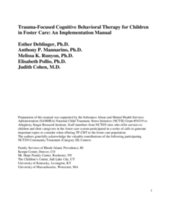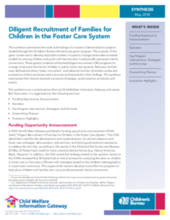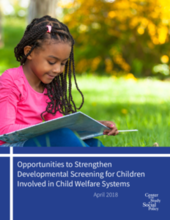Displaying 221 - 230 of 437
This article presents findings of a state-wide trauma informed child-welfare initiative with the goal of improving well-being, permanency and maltreatment outcomes for traumatized children.
The purpose of this scholarly project was to create a guide for trauma-informed interventions for occupational therapists specifically to use with foster care children.
This manual, supported by the U.S. Substance Abuse and Mental Health Services Administration (SAMHSA) National Child Traumatic Stress Initiative (NCTSI) Grant, offers guidance on the implementation of Trauma-Focused Cognitive Behavioral Therapy (TF-CBT) with children in foster care and their families.
This paper evaluates a five-module curriculum for recently immigrated youth called FUERTE (Family Reunification and Resiliency Training).
This synthesis from the U.S. Children's Bureau summarizes the work and findings of a cluster of demonstration projects aimed at developing replicable models of systemic change and evidence-based models for placing children and youth with families who could provide permanent family connections.
This study presents longitudinal analyses of the case flow of youth aged 3–17 in Washington State's foster care system, tracking rates of screening, scoring above or below clinical criteria cutoff scores, and service receipt.
In this project, researchers provided foster parents with a trauma-informed, evidence-based parenting program (Incredible Years; IY) and assessed its impact on child behavior, foster parent stress and attitudes, and perceived effect on parenting.
This article presents evidence for innovative service models from within and outside of the parenting literature that provide support to individuals and families in communities of poverty, highlighting aspects of service models that align with the needs of high poverty families.
This resource from the U.S. Center for the Study of Social Policy presents recommendations highlighting strategies for improving the delivery of developmental screening and early intervention for children who become known to state and local child welfare systems.
The current study considers the educational experiences of unaccompanied immigrant children (UIC) in the Chicago metropolitan area from the perspective of diverse education, human service, and legal professionals that work with this population in Office of Refugee Resettlement (ORR) facilities, post-release, and community contexts.



